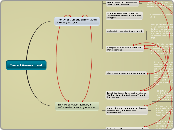Tiered Assessment
Tier One: Campus Information Literacy Program
Intellectual Skills Rubrics Assessment (General Education Program)
used to help determine/benchmark students level of information literacy development
Department Curriculum and Assessment Reports
help to determine where information literacy instruction would be helpful to address concerns and challenges that departments are experiencing
Standardized Assessment of Information Literacy Skills test (SAILS)
benchmarks students information literacy skills
Collegiate Learning Assessment
college administers the test every other year. elements of critical thinking are used to discuss critical thinking about information, students ability to do so, and the need to explicitly teach critical thinking and information literacy as a way to do that.
Campus Map of Intellectual Skill Development
Map of intellectual skills and where they are being developed in the general education program. Includes both where the skills are being developed, as well as, in some cases how well students are doing.
Tier Two: Mason Library's Information Literacy Program
Classroom Assessment Techniques
focus on performance assessments and collection of student artifacts in sessions. Librarians quickly assess the artifacts collected. individually to provide feedback to students and faculty in aggregate. Then at the end of the semester librarians assess a random sample of artifacts collected from sessions taught for core courses in the general education program or within a department using a common rubric.
Identification of Information Literacy Student Learning Outcomes Taught for courses
collecting data on which courses librarians work with and for which IL outcomes. this includes librarin led instruction and units that might be provided to support faculty, and not librarian led instruction.
Data collection on number of faculty worked with, and from which departments
This provides an overall view of where we are working and where we are not. Also provides information on the level, overall, of courses that we work with, 100, 200, 300, 400, etc.
Collection of learning outcomes from research questions at the reference desk
when a reference question is identified as a "research" question (a question that requires a significant amount of time and some development of skill) the librarian identifies the relevant IL learning outcomes addressed. When possible, the student elects to provide information about which course the question is from, and their stauts (freshman, sophmore, junior, senior, grad).
Data gathered from Blackboard and LibGuides use
IL units, designed by librarians, embedded into Blackboard courses and LibGuides
